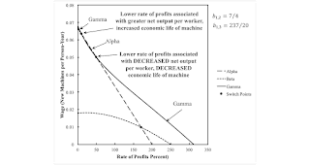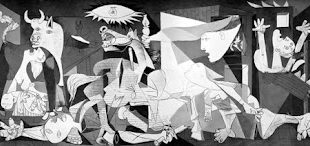1.0 Introduction John Maynard Keynes had some amusing jibes against Marx, but does not provide any substantial argument against the theory in Marx's Capital. In fact, one can draw parallelisms between elements of Keynes' and Marx's theories. This post provides a brief start on justifications for these assertions. 2.0 Jibes Keynes' most explicit and most well-known statement about Marx is probably this: "How can I accept a doctrine which sets up as its bible, above and beyond criticism,...
Read More »Traditional And ‘Perverse’ Switch Points For Austrian And Neoclassical Economics
Figure 1: The Wage-Rate of Profits Frontier1.0 Introduction This is one in a series of posts demonstrating that the change in the economic life of a machine at a switch point is independent of the change of the capital intensity of the technique at a switch point. I want to illustrate each entry in a two-by-two table in a previous post. The example in this post has two switch points. One fits the traditional Austrian and neoclassical stories, as in the entry in the upper-left of the table....
Read More »Elsewhere
Matt McManus on Thomas Sowell. A review of Adam Shatz's biography of Frantz Fanon. Nathan Robinson interviews Kohei Saito on degrowth. I have not read Bob Rowthorn on neo-ricardianism in decades. I wish NLR made PDFs of old articles freely available.
Read More »To Do: Perverse Switch Points And The Economic Life Of A Machine
Table 1: Lower Rate of Profits Around A Switch Point Traditional Marginalist Story'Perverse' Marginalist StoryTraditional Austrian StoryNegative real Wicksell effect, greater net output per workerPositive real Wicksell effect, smaller net output per workerLonger economic life of machineLonger economic life of machine'Perverse' Austrian StoryNegative real Wicksell effect, greater net output per workerPositive real Wicksell effect, smaller net output per workerShorter economic life of...
Read More »New Interpretations Of Marx
This post is basically complaining that I cannot keep up. I think I am fairly informed on Karl Marx. I do not read German, and I have not even read some early works. My area of concentration is reading Capital as a work of mathematical economics, which cuts against the subtitle and, maybe, de-emphasizes a break with classical, especially, Ricardian political economy. More generally, I thought Marx generally praises the tremendous increase of productivity brought about by the...
Read More »Labor Values And Invariants
1.0 Introduction This post is an attempt to work through some linear algebra that some have used to understand Karl Marx's Capital. I have recently explained how, in a simple model, prices of production are equal to labor values if the organic composition of capital does not vary among industries. That special case is the setting of volume 1. In capitalism, workers rent themselves out to their employers. They work longer, under the dominion of capital, than needed to produce the...
Read More »Utility Maximization A Tautology?
Economists proved over half a century ago that certain stories are unfounded in the theory. For example, one might think that if some workers are involuntarily unemployed, a drop in real wages would lead to a tendency for the labor market to clear. The Cambridge Capital Controversy revealed some difficulties. In response, some economists turned to the Arrow-Debrue-McKenzie model of intertemporal equilibria in which it is not clear that one could even talk about such concepts. The...
Read More »Elsewhere
Solidarity Federation Francisco Nunes-Pereira and Mário Graça Moura. On the survival of a flawed theory of capital: mainstream economics and the Cambridge capital controversies, Cambridge Journal of Economics. Concludes mainstream economists continue to use flawed aggregate production functions because of an instrumentalist methodology and conformism. . Colin Rogers. Whitehead’s fallacy of misplaced concreteness and the unfortunate uselessness of all monetary-macro theory micro-founded...
Read More »Two Special Cases For The Labor Theory Of Value
1.0 Introduction A simple labor theory of value holds in two special cases. The rate of profits in the system of prices of production is zero. The vector of direct labor coefficients is an eigenvector of the Leontief input-output matrix corresponding to the maximum eigenvalue. I do not know if I've worked through this alone before. A more rigorous approach would prove the uniqueness of the solution. 2.0 The Setting Suppose a capitalist economy is observed at a given point in time. n...
Read More »Orwell Remembers Revolution
Pablo Picasso's Guernica This post has long quotations, as is typical of a commonplace book. Where did socialism work? In Barcelona, Spain, and, more generally Aragon and Catalonia, from August 1936 to April 1937. This was the anarchist version, and was resisted by all governments, including the Soviet Union. The right staged their coup against the Republic in July 1936. Orwell went to Spain in December, and he wanted to kill fascists. He describes it as almost happenstance that he...
Read More » Robert Vienneau: Thoughts Economics
Robert Vienneau: Thoughts Economics


